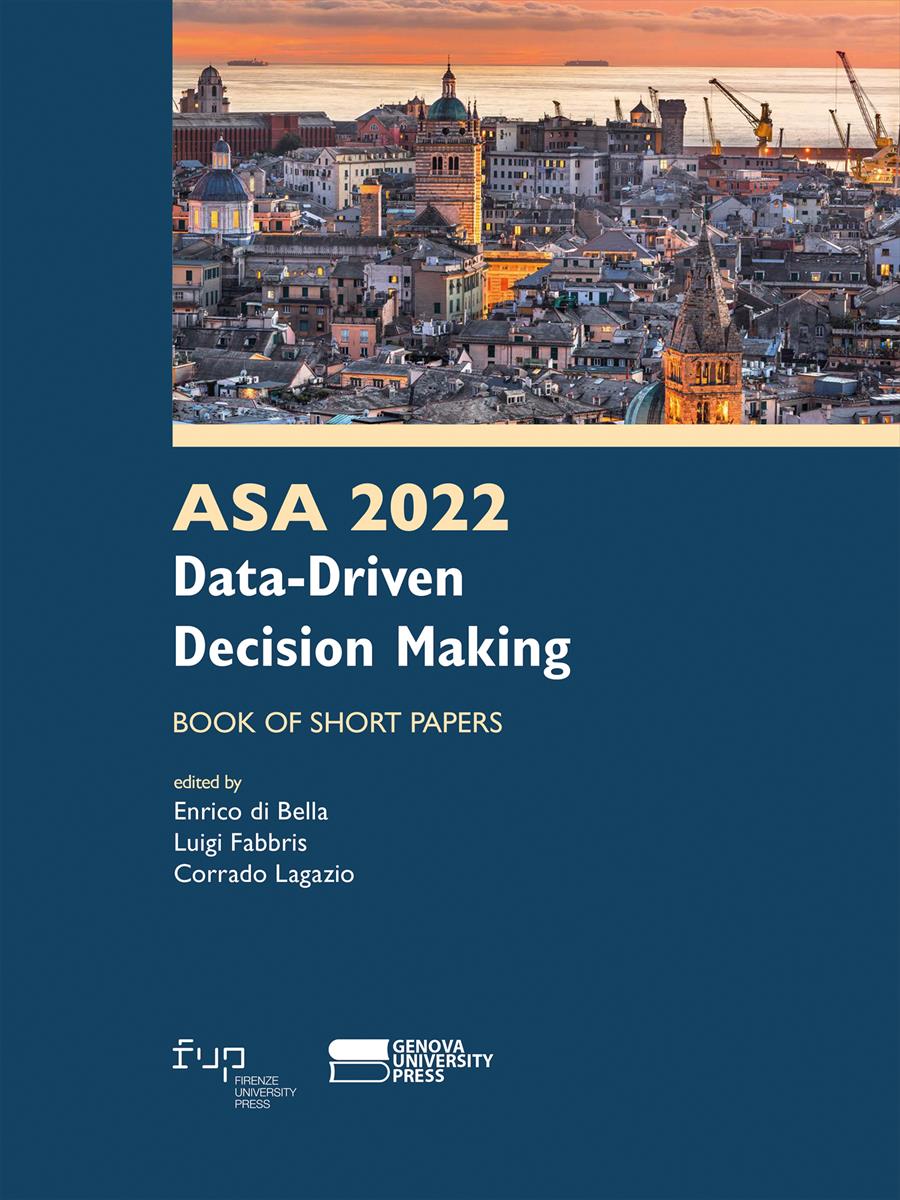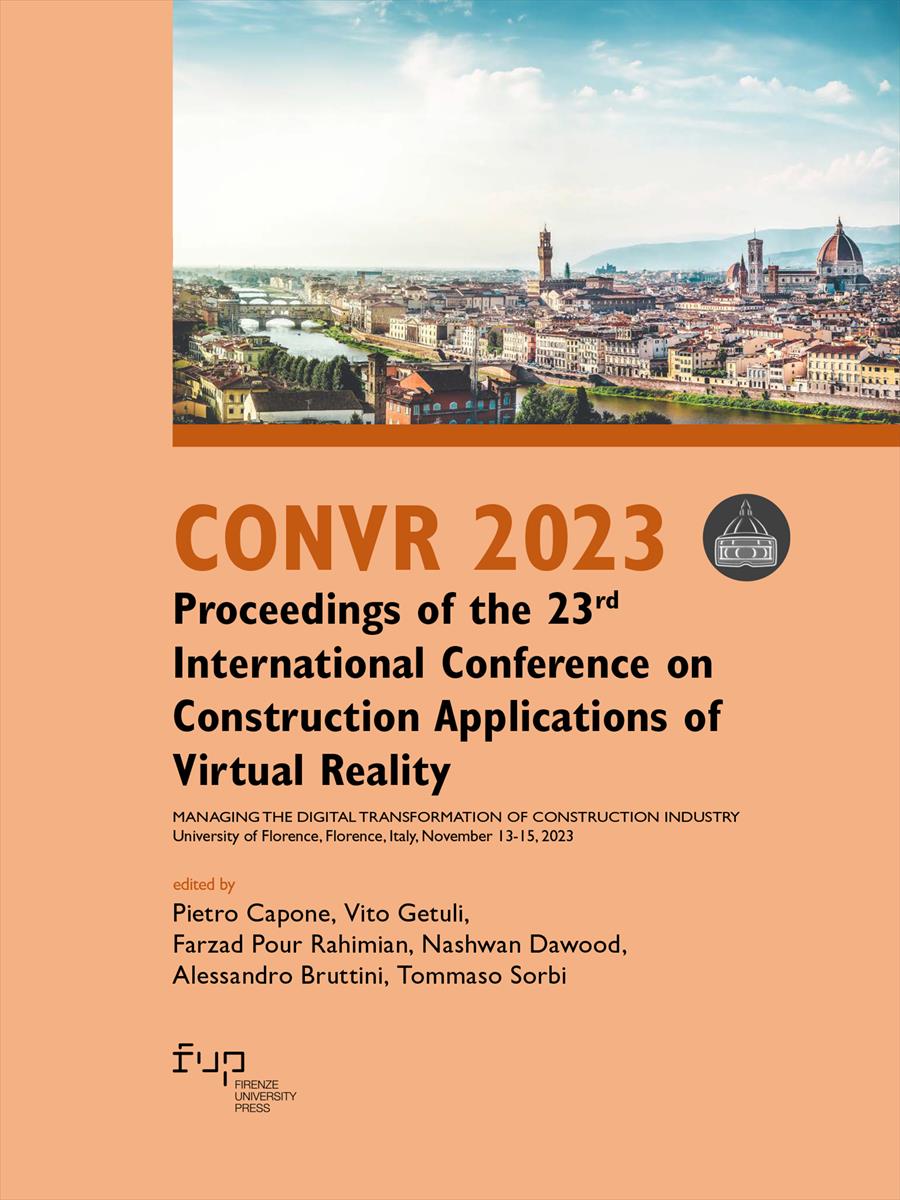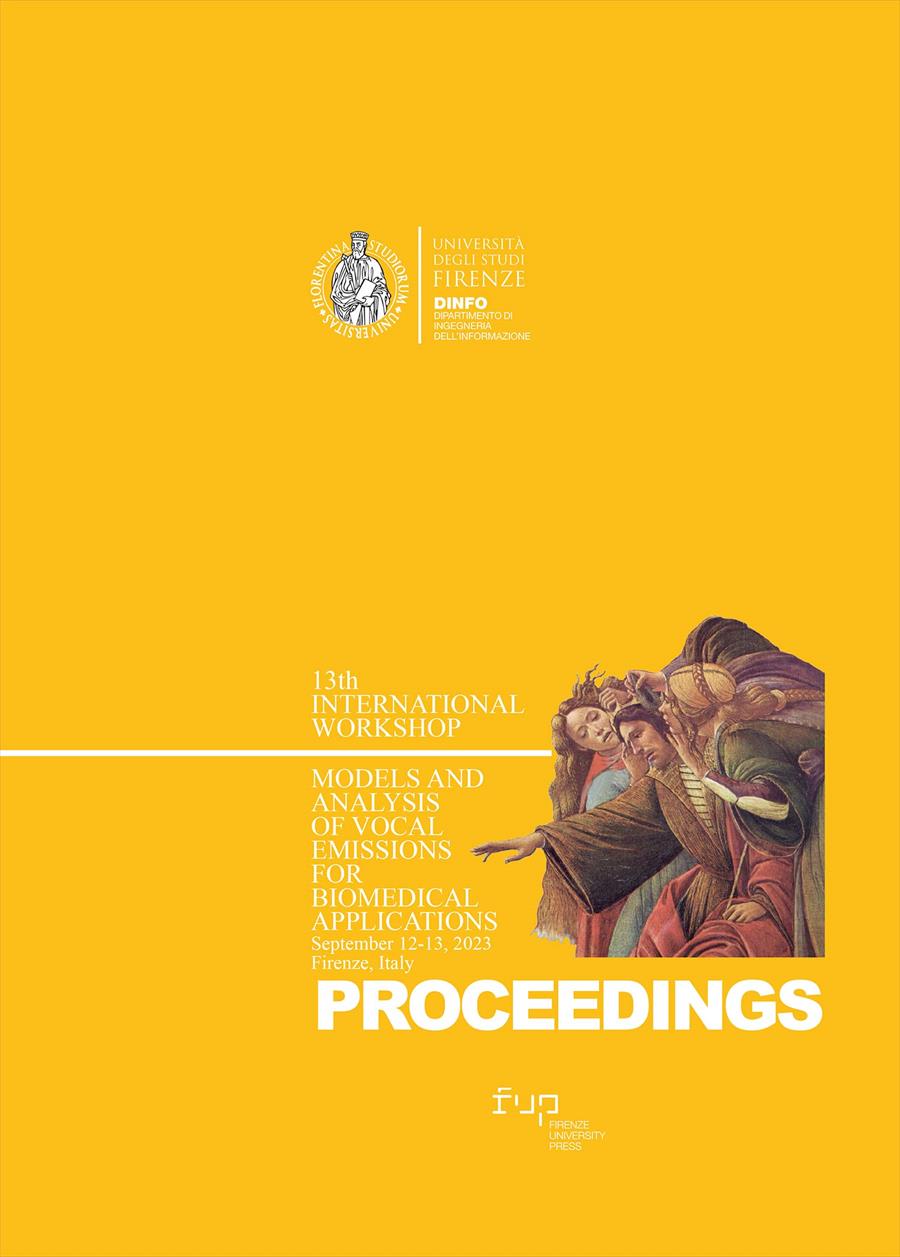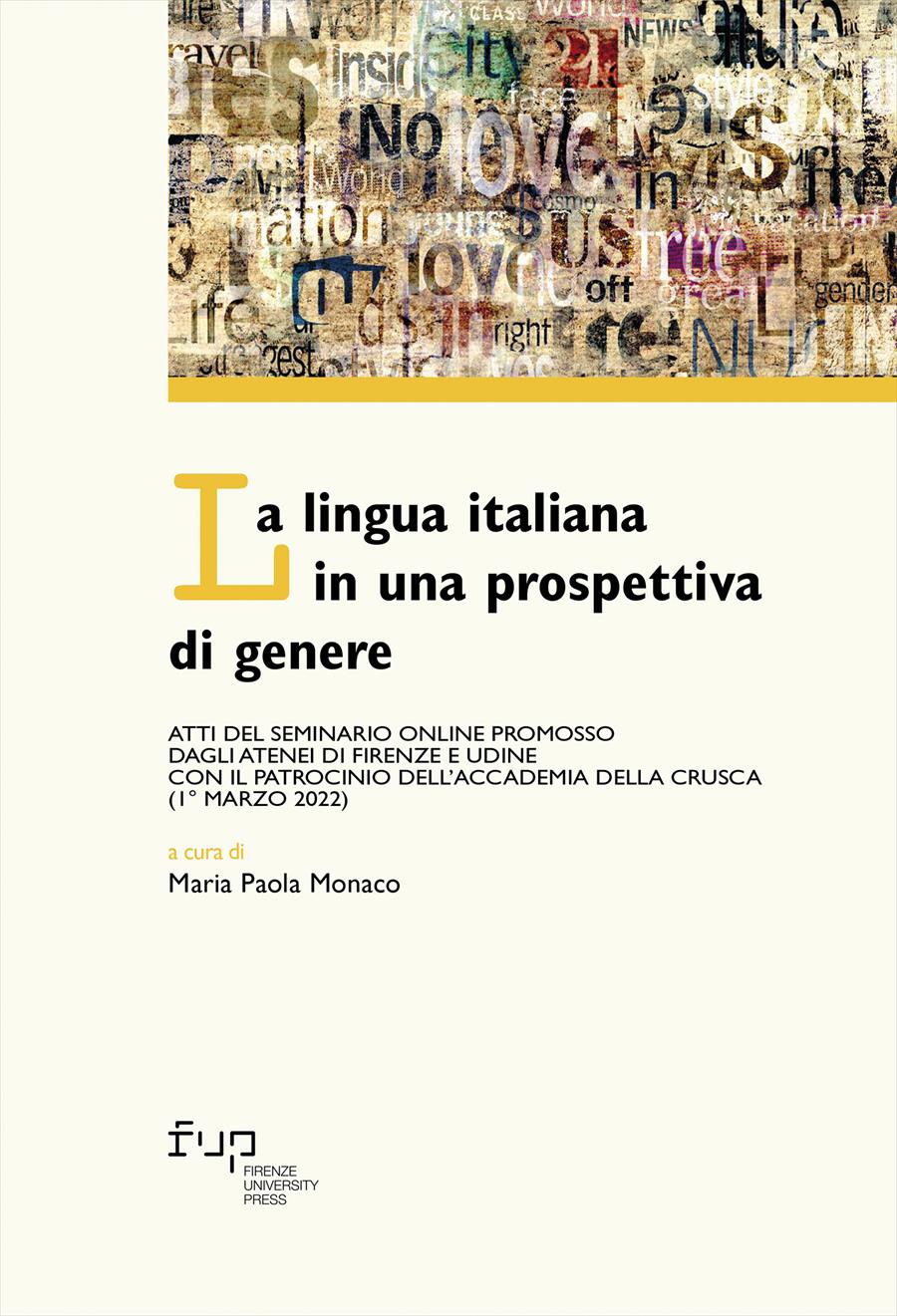ASA 2022 Data-Driven Decision Making
Book of short papers
- Edited by:
- Enrico di Bella,
- Luigi Fabbris,
- Corrado Lagazio,
This volume collects the contributions presented at the conference “Data-driven Decision Making” organized by the Italian Association for Applied Statistics, held in Genoa from 12 to 14 September 2022.
The papers cover a broad range of topics, with a common thread: the use of statistical methods to support decision-making both in public administrations and in private companies.
- Keywords:
- Applied Statistics,
- Decision making,
- Evaluation of Educational Systems,
- Health and well-being,
- Industrial risk,
- DOI: 10.36253/979-12-215-0106-3
- Series: Proceedings e report
- Scientific Board: Consiglio Editoriale FUP 2021-2024
- Language: English
- Subjects: Statistics
- Download PDF
-

- © 2023 Author(s)
- CC BY 4.0
University of Genoa, Italy - ORCID: 0000-0002-2792-3476
University of Padua, Italy - ORCID: 0000-0001-8657-8361
University of Genoa, Italy - ORCID: 0000-0002-2268-3469
Luigi Fabbri is President of the Italian Association for Applied Statistics and former Professor of Social Statistics at the University of Padua.
Corrado Lagazio is Professor of Statistics at the Department of Economics of the University of Genoa.
Silvia Bacci, Bruno Bertaccini, Alessandra Petrucci, Valentina Tocchioni
Assessing the predictive capability of Invalsi tests on high school final mark- CC BY 4.0 |
- © Author(s)
-

pp.11-16
G. Damiana Costanzo, Michelangelo Misuraca, Angela Coscarelli
Profiling students’ satisfaction towards university courses with a latent class approach- CC BY 4.0 |
- © Author(s)
-

pp.17-22
Matteo Corsi, Luca Persico, Sara Preti, Agnese Sechi
The relation between students’ educational performances and their access test results: a focus on an Italian case- CC BY 4.0 |
- © Author(s)
-

pp.23-28
Simona Ballabio, Arianna Carra, Flavio Verrecchia, Alberto Vitalini
Structure and dynamics of immigration in the municipalities of northwestern Italy- CC BY 4.0 |
- © Author(s)
-

pp.29-34
Luigi Bollani, Simone Di Zio, Luigi Fabbris
Are Italian youngsters adequately equipped for an after-pandemic upswing?- CC BY 4.0 |
- © Author(s)
-

pp.35-40
Margherita Silan, Riccardo Bellide
How Italians coped with COVID-19 lockdown: evidence from a survey promoted through social networks- CC BY 4.0 |
- © Author(s)
-

pp.41-45
Emanuela Recchini
Official statistics for measuring the sustainability of tourism: the UNWTO initiative- CC BY 4.0 |
- © Author(s)
-

pp.47-52
Giulio Giacomo Cantone, Venera Tomaselli
Misinformation and disinformation in statistical methodology for social sciences: causes, consequences and remedies- CC BY 4.0 |
- © Author(s)
-

pp.53-58
Demetrio Panarello, Gennaro Punzo
The impact of economic insecurity on life satisfaction among German citizens- CC BY 4.0 |
- © Author(s)
-

pp.59-64
Luigi Fabbris, Alfonso Piscitelli
Cultural and sensorial correlates of Trebbiano wine consumption- CC BY 4.0 |
- © Author(s)
-

pp.65-70
Fabrizio Antolini, Antonio Giusti, Francesca Petrei
Tourism and territorial economy: beyond satellite accounting- CC BY 4.0 |
- © Author(s)
-

pp.71-76
Andrea Marletta, Roberta Rossi, Elena Diceglie
Short-term forecasts on time series for tourism in Lombardy- CC BY 4.0 |
- © Author(s)
-

pp.77-82
Giulia Cavrini, Nadia Paone, Evan Tedeschi
Interventions for non-self-sufficiency – Focus on care and social policies in South Tyrol- CC BY 4.0 |
- © Author(s)
-

pp.83-88
Raffaele Attanasio, Manlio Calzaroni, Alessandro Ciancio, Federico Olivieri, Giovanni Siciliano
The territorialisation of the 2030 Agenda: a multilevel approach- CC BY 4.0 |
- © Author(s)
-

pp.89-94
Cristina Davino, Nicola D'Alesio
Sustainable development goals: classifying European countries through self-organizing maps- CC BY 4.0 |
- © Author(s)
-

pp.95-100
Pasquale Anselmi, Daiana Colledani, Simone Di Zio, Luigi Fabbris, Egidio Robusto
Individual and social aspects of after-Covid-19 pandemic depression- CC BY 4.0 |
- © Author(s)
-

pp.101-106
Fabrizio Antolini, Samuele Cesarini, Francesco Giovanni Truglia
Spread of Covid-19 epidemic in Italy between March 2020 and February 2021: empirical evidence at provincial level- CC BY 4.0 |
- © Author(s)
-

pp.107-112
Giancarlo Carbonetti, Stefano Daddi, Giampaolo De Matteis, Marco Di Zio, Davide Fardelli, Raffaele Ferrara, Fabio Lipizzi, Enrico Orsini
New perspectives for the quality of sub-municipal data with the Italian permanent population and housing census- CC BY 4.0 |
- © Author(s)
-

pp.113-118
Stefano Mugnoli, Alberto Sabbi, Fabio Lipizzi
The Land Cover/Use Code of the new Istat Census cartography- CC BY 4.0 |
- © Author(s)
-

pp.119-124
Massimo De Cubellis, Gerarda Grippo
Trusted Smart Statistics: new statistics for decision makers. The Istat’s experience- CC BY 4.0 |
- © Author(s)
-

pp.125-128
Laura Benedan, Angela Digrandi, Paolo Mariani, Cinzia Pilo, Mariangela Zenga
Quality of life in Health Care: focus on patients- CC BY 4.0 |
- © Author(s)
-

pp.129-133
Andrea Marino, Marco Pesce, Raffaella Succi
Access to emergency care services and inequalities in living standards: Some evidence from two Italian northern regions- CC BY 4.0 |
- © Author(s)
-

pp.135-140
Giulia Cavrini, Elisa Cisotto, Alex Weissensteiner
Population ageing and sustainability in South Tyrol: measuring the economic implications of an ageing society- CC BY 4.0 |
- © Author(s)
-

pp.141-144
Demetrio Panarello, Giorgio Tassinari
Job loss and financial struggle among the older age groups in 2021: Lessons from the European Union- CC BY 4.0 |
- © Author(s)
-

pp.145-149
Chiara Bocci, Emilia Rocco
On the use of auxiliary information in spatial sampling- CC BY 4.0 |
- © Author(s)
-

pp.151-156
Giuseppe Bove
Measures of interrater agreement when each target is evaluated by a different group of raters- CC BY 4.0 |
- © Author(s)
-

pp.157-162
Yuri Calleo, Simone Di Zio, Francesco Pilla
A Natural Language Processing approach to measure expertise in the Delphi-based scenarios- CC BY 4.0 |
- © Author(s)
-

pp.163-168
Maria Serena Causo, Erika Cerasti, Fabrizio De Fausti, Monica Scannapieco
Exploring Globalization with Cosmopolitics- CC BY 4.0 |
- © Author(s)
-

pp.169-173
Maria Cristiana Martini, Aldo Arra
Professional choices and personal values: Similarities and differences between Schein’s career anchors and Schwartz basic values- CC BY 4.0 |
- © Author(s)
-

pp.175-180
Michele Lalla, Patrizio Frederic
Factors affecting tertiary education decisions of immigrants in Italy- CC BY 4.0 |
- © Author(s)
-

pp.181-186
Giovanni Busetta, Maria Gabriella Campolo, Antonia Cava
Internet use, feeling of unacceptance and Loneliness: immigrants of first and second generation in Italy- CC BY 4.0 |
- © Author(s)
-

pp.187-192
Sergio Salamone, Alessandro Faramondi, Stefania Della Queva
A composite indicator to measure regional investment policies on R&D and innovation- CC BY 4.0 |
- © Author(s)
-

pp.193-196
Anna Maria Parroco, Micaela Arcaio
Assessing intimate partner violence in African countries through a model-based composite indicator- CC BY 4.0 |
- © Author(s)
-

pp.197-202
Adelia Evangelista, Annalina Sarra, Tonio Di Battista
Students’ feedback on the digital ecosystem: a structural topic modeling approach- CC BY 4.0 |
- © Author(s)
-

pp.203-208
Susanna Traversa, Enrico Ivaldi
The digitization of the private sector in the Italy. A non-aggregative method to monitor the NRRP agenda at macro-area level- CC BY 4.0 |
- © Author(s)
-

pp.209-214
Teresa Maltese, Maria Santarcangelo, Vito Santarcangelo, Diego Sinitò, Aneta Poniszewska-Marańda, Jure Šuligoj, Alcidio Jesus, Elisardo Sanchis
Digital.VET : An innovative approach for teaching and training- CC BY 4.0 |
- © Author(s)
-

pp.215-220
Luca Bungaro, Marta Desimoni, Mariagiulia Matteucci, Stefania Mignani
The joint estimation of accuracy and speed: An application to the INVALSI data- CC BY 4.0 |
- © Author(s)
-

pp.221-226
Alessandro Fusta Moro, Matteo Salis, Andrea Zucchi, Michela Cameletti, Natalia Golini, Rosaria Ignaccolo
Ammonia emissions and fine particulate matter: some evidence in Lombardy- CC BY 4.0 |
- © Author(s)
-

pp.227-232
Lorenzo Valleggi, Federico Mattia Stefanini
On the utility of treating a vineyard against Plasmopara viticola: a Bayesian analysis- CC BY 4.0 |
- © Author(s)
-

pp.233-237
Maria Gabriella Grassia, Marina Marino, Rocco Mazza, Michelangelo Misuraca, Agostino Stavolo
Topic modeling for analysing the Russian propaganda in the conflict with Ukraine- CC BY 4.0 |
- © Author(s)
-

pp.245-250
Maria Gabriella Grassia, Marina Marino, Rocco Mazza, Agostino Stavolo
The relationship between religiosity, religious coping, and anxieties about the future: a multidimensional analysis on the Evangelical churches of Naples- CC BY 4.0 |
- © Author(s)
-

pp.251-256
Pierluigi Calabrese, Paola Lunalbi, Vincenzo Ribaudo, Saverio Crisafulli, Antonio Ruoto, Vito Santarcangelo, Diego Sinitò, Carlo Bonelli, Giuseppe Stella
Application of the guidelines of the Agency for Digital Italy guidelines and CSA Star self-assessment: A Docustar case study- CC BY 4.0 |
- © Author(s)
-

pp.257-262
Luigi Bollani, Simone Di Zio, Luigi Fabbris
Remote working in Italy: Just a pandemic accident or a lesson for the future?- CC BY 4.0 |
- © Author(s)
-

pp.263-268
Simone Di Zio, Luigi Fabbris
Repression of the future-oriented disposition of Italians by a never-ending pandemic- CC BY 4.0 |
- © Author(s)
-

pp.269-274
Giuliana Coccia, Emanuela Scavalli
Monitoring and evaluation of gender equality policies- CC BY 4.0 |
- © Author(s)
-

pp.275-280
Alice Tontodimamma, Stefano Anzani, Marco Antonio Stranisci, Valerio Basile, Elisa Ignazzi, Lara Fontanella
An experimental annotation task to investigate annotators’ subjectivity in a Misogyny dataset- CC BY 4.0 |
- © Author(s)
-

pp.281-286
Elisa Benedetti, Gabriele Lombardi, Rodolfo Cotichini, Sonia Cerrai, Marco Scalese, Sabrina Molinaro
Potential risk of gambling products and online gambling among European adolescents- CC BY 4.0 |
- © Author(s)
-

pp.287-292
Giuseppe Sindoni, Matteo Massenzio
An Open Data platform for decision making in local public administration- CC BY 4.0 |
- © Author(s)
-

pp.293-298
Laura Bisio, Matteo Lucchese
Educational mismatch and productivity: evidence from LEED data on Italian firms- CC BY 4.0 |
- © Author(s)
-

pp.299-304
Gabriella Fazzi, Manuela Murgia, Alessandra Nuccitelli, Francesca Rossetti, Valentino Parisi, Roberta Piergiovanni, Luigi Arlotta, Maura Giacummo
A paradata-driven statistical approach to improve fieldwork monitoring: the case of the Non-Profit Institutions census- CC BY 4.0 |
- © Author(s)
-

pp.305-310
Margherita Silan, Giovanna Boccuzzo
Gender INequality Indicator for Academia (GINIA)- CC BY 4.0 |
- © Author(s)
-

pp.311-316
Bibliographic Information
Book Title
ASA 2022 Data-Driven Decision Making
Book Subtitle
Book of short papers
Editors
Enrico di Bella, Luigi Fabbris, Corrado Lagazio
Peer Reviewed
Publication Year
2023
Copyright Information
© 2023 Author(s)
Content License
Metadata License
Publisher Name
Firenze University Press, Genova University Press
DOI
10.36253/979-12-215-0106-3
eISBN (pdf)
979-12-215-0106-3
eISBN (xml)
979-12-215-0107-0
Series Title
Proceedings e report
Series ISSN
2704-601X
Series E-ISSN
2704-5846






